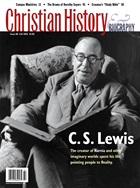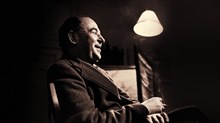CS. Lewis had a day job. It is strange to think of it that way, for most of us perhaps imagine the prolific Lewis investing countless hours at his desk crafting whimsical children's fantasies or creating formidable arguments to advance "mere Christianity." In fact, he was a renowned scholar of medieval and renaissance literature—first at Oxford, then later at Cambridge—for almost 30 years. How illustrious and gifted was he? Enough to shock his profession by inaugurating rather than climaxing his career with a magnum opus entitled The Allegory of Love. This work skillfully and effortlessly transported modern readers into the medieval woridview, helping them see what chivalry and the courtly tradition of love looked like from the inside out, demolishing the cliché s that had built up around this historical period. It exemplified and forecast all of the salutary traits of his literary scholarship (and later apologetics and fiction) that would astonish colleagues and endear him to his students. Here on abundant display, just as in the Chronicles of Namia orThe Problem of Pain or Miracles, are his incisive wit, rhetorical eloquence, perspicaciousness of coverage, and, most importantly, his respect for the past.
Kenneth Tynan, a former pupil of Lewis's, cap ture it well: "The great thing about him as a teacher of literI ature was that he could take you into the medieval mind and the mind of a classical writer. He could make you Understand that classicism and medievalism were really vivid and alive—that it was not the business of literature to be 'rel evant to us, but our business to be 'relevant' to it. It was not a matter of dead books covered in dust on our shelves. He could make you see the world through the eyes of a medieval poet as no other teacher could do. You felt that you had been inside Chaucer's mind after talking to him."
Oddly enough, given this sterling reputation as a learned and enthusiastic expositor of medieval and renaissance literature, C. S. Lewis rejected the term "literary critic." At its worst, this implied for him a set of tasks that enshrined what his friend Owen Barfield called "chronological snobbery"— a scholarly disdain for the past and our ability to recover or understand rightly the works and woridviews of antiquity. Besides, many in the collegiate world declared, the past— even if it were possible to recover it faithfully—would invariably be wrong about everything.
Lewis was not so defeatist and skeptical about the past, though he knew as well as anyone that it was hard work to wade into history and write confidently and accurately about its texts and personages. The term "literary historian" best fits him, since it calls attention to the primary motivation that characterized Lewis as a reader and lover of literature: to show the past to be alive and influential for the present—and the future. His own scholarly approach, expressed in a letter to a colleague, Kathleen Raine, only two weeks before his death, was to display in every project "plenty of fact, reasoning as brief and clear as English sunshine, and no personal comment at all."
To read, he declared in his last and most visceral work of literary scholarship, An Experiment in Criticism, is not to "aggrandize the self," but rather to transcend it, leaving behind one's prejudices and preconceptions and breaking through the provincialism of one's own times. To read and to research with this goal forced the scholar to recognize that "in coming to understand anything we are rejecting the facts as they are for us in favor of the facts as they are."
Searching for the "facts as they are," putting aside the self, and letting the past come forward to challenge the present—these sentiments were not only integral to Lewis's most enduring scholarly works, they were also of one piece with his Christian woridview. It is this same respect for history that brought him to the enriching concept of "mere Christianity." He argued in his essay "On the Reading of Old Books" that in the company of our ancient and medieval brothers and sisters we find unity amidst the divisions in Christendom—that only by going outside of our own age can we discover the truth that "measured against the ages 'mere Christianity' turns out to be no insipid interdenominational transparency, but something positive, self- consistent, and inexhaustible."
From his lively survey English Literature in the Sixteenth Century to his examination of medieval cosmology in The Discarded Image, Lewis's literary histories show his desire to reach backward into time to guide and to guard the present, thus equipping readers to see the past with fresher and less biased eyes. The scholarship that results from such conviction is the report of an intrepid explorer who has experienced what it is to look through others' eyes, to think as they thought, and to behave as they behaved within their cultural period.
As he explains in his 1939 meditation on scholarship, "Learning in War-Time,"
"Most of all, perhaps, we need intimate knowledge of the past.… A man who has lived in many places is not likely to be deceived by the local errors of his native village; the scholar has lived in many times and is therefore in some degree immune from the great cataract of nonsense that pours from the press and the microphone of his own age."
Bruce L. Edwards is professor of English and associate dean for international programs and distance education at Bowling Green State University in Ohio.
Copyright © 2005 by the author or Christianity Today/Christian History magazine.
Click here for reprint information on Christian History.

Support Our Work
Subscribe to CT for less than $4.25/month





























